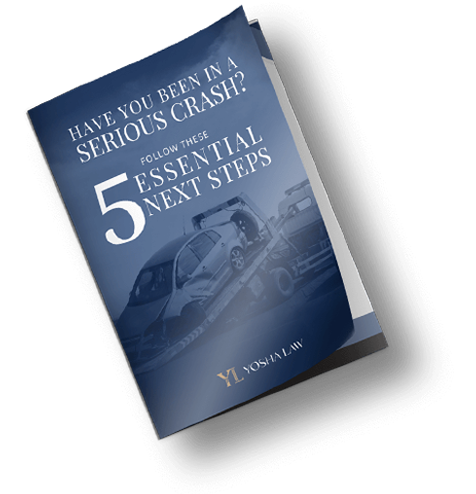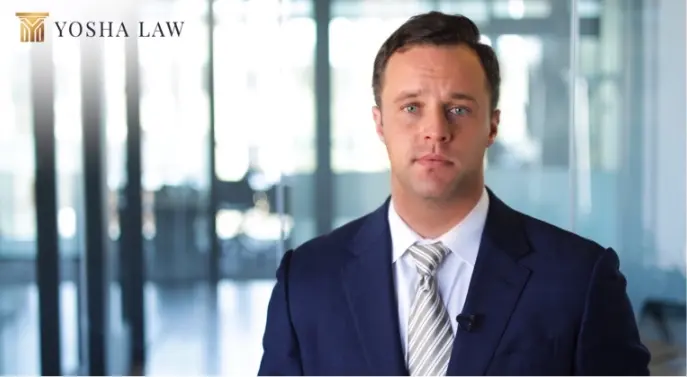
After a car accident, it may be obvious which driver was at fault: A car in the passing lane merged into your vehicle, or someone ran a red light and t-boned your car. However, in other instances, proving liability in a car accident may be murkier.
Your car suffered major damage and you’ve been left with major injuries. Nonetheless, in order to receive compensation, you need to clearly show the other driver was at fault. How can you prove liability in a car accident case? How can a lawyer help?
You need to have documentation to bolster your case, and a car accident lawyer can offer guidance to get you the compensation you deserve.

Why an insurance company might deny your liability claim
As the first step on the road to justice after a car accident, you’ll need to contact both your insurance carrier and the insurer of the other driver. This may feel like a daunting step, as giant insurance companies are often reluctant to pay out claims.
However, if you end up filing a case with the court system, it’s vital that you prove the settlement offered by the insurance company is insufficient or was denied. Why would an insurance company deny your claim? Isn’t this what vehicle insurance coverage is for?
Some of the reasons an insurer might deny your car accident claim include:
- Police Report Contradictions:
If you file a liability claim, but the police report doesn’t indicate fault, or lists you as the at-fault driver, your claim could be denied.
- Lack of Coverage:
If your claim exceeds the amount of coverage the at-fault driver holds, their company could deny your claim. For example, if the at-fault driver doesn’t have comprehensive and collision car insurance and minimum liability coverage, you may need greater compensation than their policy can pay out.
- Proof of Fault:
If you can’t prove that another driver was to blame for your car accident, your liability insurance claim could be denied. That’s why it’s important to file a police report at the scene of the accident (if possible).
- Failure to Seek Medical Attention:
If your car accident case includes a personal injury claim, but you didn’t receive a diagnosis or medical treatment, the insurer may deny your claim. However, you may still be able to prove liability.
- Failure to File:
Most insurance companies have a time window on claims. Typically, you have 30 days from the date of your accident to file your claim. Thus, if you wait too long, your claim may be denied.
You can appeal a claim denial with the insurer, however, a large insurance company may not budge on their claim rejection. A car accident lawyer can help you fight a denied claim.
Steps to prove liability in a car accident case
In the aftermath of your car accident, you may feel overwhelmed by your trauma and stressed about the unexpected costs you’ve incurred. Proving liability might be the last thing on your mind. However, it’s important that you take the necessary steps to protect yourself and to prove fault.
If you’re able to, pull over to the side of the road. When you make contact with the other driver, do not apologize for the accident or admit any level of fault. It’s natural to feel shock and want to offer an apology, but it’s vital that you refrain. Anything you say could come back to haunt you should you take your case to court.
The following steps are helpful in proving liability in your car accident case.
You Get ONE Shot At Full Justice. We Make Sure You Take It.
*Available 24/7 & Obligation-Free
File a police report
Most regions in Indiana allow you to file your police report online (depending on the severity of your accident). However, if you file your report at the scene of your accident, the responding police officers will conduct a short investigation of your collision.
First responders may be able to make an initial determination of fault at the scene of your accident. Along with contact information and any eyewitnesses, this will be recorded in your police report. A police report that records the fault of another driver can provide the foundation for your liability claim.
Seek and document medical attention
If you’re adding a personal injury claim to your car accident case, it’s important that you seek medical attention. Any medical diagnoses, treatment, and prescriptions should be documented and used for your claim. A medical professional may also be able to determine fault based on the nature of your injuries.
Take photographs and video evidence
Your injuries may prevent you from photo and video documentation at the scene of your accident. However, if you’re able, this evidence may go a long way toward proving liability. Record the damages of any vehicles involved in your accident, and any debris or skid marks present as a result of your collision.
What is comparative fault?
Many states (including Indiana) have comparative fault laws. This means that the compensation you receive can be impacted by the amount of fault you hold for your accident. For example, if a driver in front of you on the road suddenly slams on their brakes and you rear-end their vehicle, if you were following too closely, you may have a portion of legal liability.
If your liability is determined as 50% or greater, you no longer have a legal case. If you hold 30% liability for your car accident, you may still receive compensation, but the amount will be significantly less than if you held 0% fault.

How Yosha Law can help you prove liability
In order to prove liability in your car accident case, you may need to hire a lawyer. At Yosha Law, we consider our clients a part of our family, and we will fight for you to receive the compensation you’re justly owed. After a car accident, if you need help navigating the legal waters, we can do the following:
- Offer you a free consultation to explore the merits of your case
- Gather forensic evidence to prove you’re not liable for your accident
- Retain expert witnesses to examine all evidence
- Negotiate with insurance companies
- Represent you in mediations
- File all necessary legal paperwork
- Fight for you in court if negotiations fail
You shouldn’t have to face the traumatic aftermath of a car accident on your own. We can battle for you so that you can concentrate on fully living.
Frequently Asked Questions
What is the rear end collision law in Indiana?
If you were in a rear-end collision in Indiana and your vehicle was hit from behind, the driver who rear-ended you is typically considered at fault. This means you’re likely not responsible for the accident. In rear-end crashes, the driver behind is generally expected to maintain a safe distance and avoid colliding with the vehicle ahead. Ultimately, if you were hit from behind, it’s likely the other driver’s fault, not yours.







